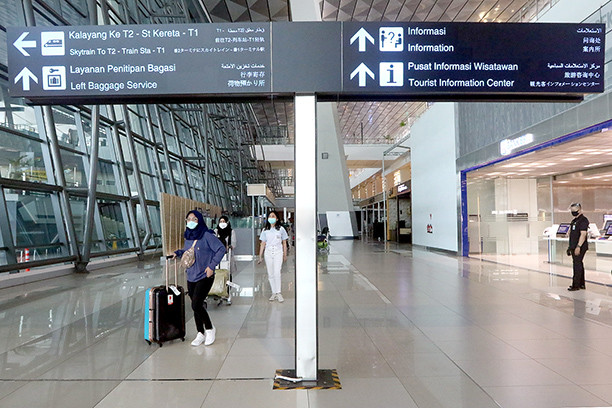Popular Reads
Top Results
Can't find what you're looking for?
View all search resultsPopular Reads
Top Results
Can't find what you're looking for?
View all search resultsINACA pins hopes on jobs law to attract investment while pilots remain wary
INACA secretary-general Bayu Sutanto said on Oct. 9 that the job law would boost investment in the country’s aviation industry, which is especially important today when demand is low and the aircraft seat load factor (SLF) hovers at around just 40 percent on average.
Change text size
Gift Premium Articles
to Anyone
T
he Indonesia National Air Carrier Association (INACA) has welcomed the new Job Creation Law, believing it will spur investment in the pandemic-battered aviation sector, while pilots remain cautious over its potential impact on the rights of airline employees.
INACA secretary-general Bayu Sutanto said on Oct. 9 that the job law would boost investment in the country’s aviation industry, which is especially important today when demand is low and the aircraft seat load factor (SLF) hovers at around just 40 percent on average.
The law will help to streamline investment in the industry through licensing, aircraft ownership and capital raising deregulation, according to Bayu.
“We really are pinning our hopes on deregulation, which is addressed by the Job Creation Law,” Bayu said during an online discussion held by marketing firm Markplus.
“There are revisions to articles in regard to air transportation non-safety licensing requirements. This will help our recovery, aside from stimulus from the government,” he added.
The aviation industry has been battered by the COVID-19 outbreak, amid international border closures and large-scale social restrictions (PSBB) that have prompted people to cancel their travel plans.
INACA has projected that the number of air passengers this year will only reach around 45.8 million, a 40 percent drop from last year’s figure of 76.6 million people. The association has recorded 33.7 million air passengers as of September, according to association data.
The recently passed job law is aimed at attracting investment and cutting bureaucratic red tape, despite opposition from labor unions, activists and other civil society groups, who fear the new law will strip away labor rights and pose environmental risks.
Read also: Environmental concerns, protests may discourage foreign investment: Moody’s
Several articles from Law No. 1/2009 on aviation have been scrapped under the Job Creation Law, according to the latest 1,035 page draft of the law made available to The Jakarta Post. One of the articles scrapped is Article 118 paragraph 2 on the Aviation Law, that requires scheduled commercial airlines to own a minimum of five aircraft and control another five aircraft as a business permit holder.
The Job Creation Law also scraps Article 110 of the Aviation Law, which includes details on the mandatory minimum five-year business plan requirement for commercial airlines to get a business permit. The requirement to operate has been simplified in Article 109 to “fulfilling the operational permit requirements set by the central government.”
Aviation industry expert and former air marshal Chappy Hakim told The Jakarta Post on Sunday that the abolishment of the minimum aircraft requirement would send a positive signal to investors seeking to establish new airlines in Indonesia.
However, he said existing airlines would not be able to enjoy the impacts of deregulation as much as the new airlines, as they had already suffered huge losses during the COVID-19 outbreak.
“New airlines will enjoy more advantages from the deregulation than existing ones. Furthermore, there is currently an excess of human capital in the aviation industry, so they [new airlines] will have a better bargaining position [during the hiring process],” he said in a phone interview.
National flag-carrier Garuda Indonesia suffered a loss of US$712.73 million in the first half of this year after booking a net profit of $24.11 million in the same period last year. To cut further losses, the company has proposed early retirement packages for around 500 employees and laid off 180 contract pilots.
Garuda Pilot Association (APG) chairperson Muzaeni told the Post that the association was currently consulting with lawyers and other unions to figure out whether there were articles in the Job Creation Law that would negatively affect airline employees.
“We had rounds of talks with our lawyers and have no issue with it so far. Insya Allah [God willing] we will hold another consultation with Garuda’s employees union,” he said.
He said that if both the pilots and airline employees’ union found articles that were deemed detrimental to the employees’ rights, they would join calls for a judicial review of the law at Constitutional Court (MK).
A number of the country’s labor unions have expressed plans to challenge the recently passed Job Creation Law through a judicial review petition filed with the court, including the All-Indonesia Workers Union Confederation (KSPSI).










